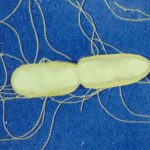Lien vers Pubmed [PMID] – 27481354
J. Med. Microbiol. 2016 Aug;
Serotyping forms the basis of all national and international surveillance networks for Salmonella. Public health microbiology is currently being transformed by high throughput DNA sequencing, which opens the door to serovar determination using this powerful technique. Twenty nine Salmonella isolates referred to Public Health England between 1994-2004 for serovar identification were selected for this study, and they all presented with novel antigenic formulae. Results from a combination of traditional phenotypic and molecular assays were compared. Twenty two isolates (76%) were subsequently independently confirmed as new types, of these 18 (82%) were grouped as S. enterica subspecies I and four (18%) were S. enterica subspecies II. In general it is shown that there is concordance between the DNA sequence type (ST) and traditional phenotypic serotype but it would be necessary to analyse a larger dataset to confirm this. Traditional Multilocus sequence typing (MLST) by Sanger sequencing also correlates to insilico Whole Genome Sequencing (WGS) MLST.This permits the continuation of traditional serovar nomenclature alongside ST methods and enhances the ability to infer true phylogenetic relationships between isolates.


